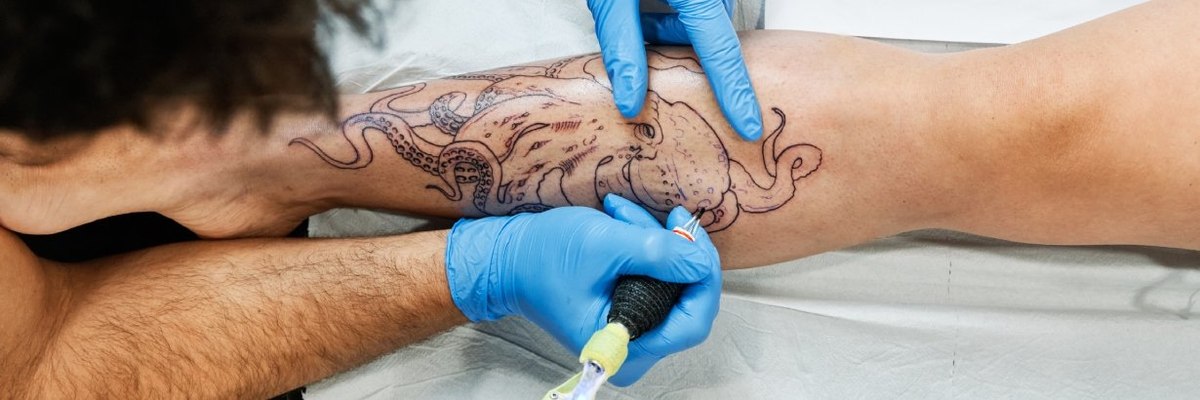Britons don’t see tattoos in general as being unprofessional, although they disapprove of face and neck tattoos
This year, Virgin Atlantic became the first UK airline to allow cabin crew to display tattoos, and police forces across the UK have been relaxing their policies on visible tattoos over the last few years to allow officers to display body art, providing it is not offensive.
A new YouGov study reveals that Britons tend take a permissive attitude to tattoos, including tattoos on police officers and teachers, although they are less forgiving about face and neck tattoos.
A quarter of Britons are inked, and one in nine have visible tattoos
A quarter (26%) of the British public have tattoos. This includes one in nine (11%) Britons who have at least one visible tattoo; on the head, face, neck, forearms, wrists or hands.
Britons between the ages of 25 and 54 are the age group most likely to be inked, with around a third (34-38%) of age groups in this range saying they have a tattoo. One in three (31%) working Britons say they have a tattoo, with 13% of workers saying they have at least one visible tattoo.
The British public are split on whether they feel positively (30%), neutral (33%) or negatively (36%) about tattoos in general, with younger Britons tending to take more of a positive view towards body art and older Britons feeling more negatively.
Approaching half of 18 to 24-year-olds (46%) and 25 to 34-year-olds (47%) say they feel positively about tattoos, with this figure falling to 33% among 45-54 year olds and just 13% of those aged 55 and older.
Are visible tattoos unprofessional?
Tattoos are not a protected characteristic, so employers can legally dismiss someone or refuse to hire them because of a tattoo. But attitudes towards tattoos among the general public are permissive: two-thirds of Britons (64%) say they wouldn’t consider visible tattoos to be unprofessional, as long as they are not on someone’s face or neck.
For face and neck tattoos, however, it is another story entirely. The figures are almost exactly reversed: 63% of the public say they would consider face and neck tattoos to be unprofessional, with just 28% saying they would not.
Older Britons are more likely to have a sterner attitude towards visible tattoos in general, not just face and neck tattoos: 42% of those aged 55 and older say they would consider a visible tattoo not on someone’s face or neck to be unprofessional, compared to 48% who would not. Britons under 55 have a much more favourable outlook on visible ink: 69% to 79% say a visible tattoo not on someone’s face or neck is not unprofessional.
Finally, while most over-35s see face and neck tattoos as unprofessional, Britons under 35 are split: by 44% to 41% among 18 to 24-year-olds, and by 47% to 43% for 25 to 34-year-olds.
Are visible tattoos acceptable for people-facing professions?
With Virgin Atlantic now allowing visible tattoos for cabin crews and police forces relaxing regulations around visible tattoos, YouGov asked the British public whether they thought visible tattoos would be acceptable for people working in various professions, including office workers, emergency workers and other customer-facing services.
At least half of the public say that visible tattoos would be acceptable for all nine professions asked about in our survey, although they are less likely to say that face and neck tattoos are acceptable.
At the top end, three-quarters of Britons (75%) say visible tattoos would be acceptable on people working in low-end customer-facing services, like flight attendants at budget airlines or mass-market retail staff, with similar numbers (73%) saying the same for firefighters. This includes three in ten (30-31%) who say that face and neck tattoos would be acceptable for these workers.
Britons are least likely to say visible tattoos are acceptable on teachers, although half (52%) still feel this way, including 18% who would think it’s ok for teachers to have face and neck tattoos. Four in 10 Britons (42%) say it is not acceptable for teachers to have any visible tattoos.
Older Britons, who tend to take a less forgiving attitude about body art in general, are also more selective about which professions they would accept visible tattoos in, and which they would not. This attitude is largely seen only in the oldest group – with Britons under 55 tending to be similarly accepting of tattoos across all roles asked about.
Header image: Getty Images










